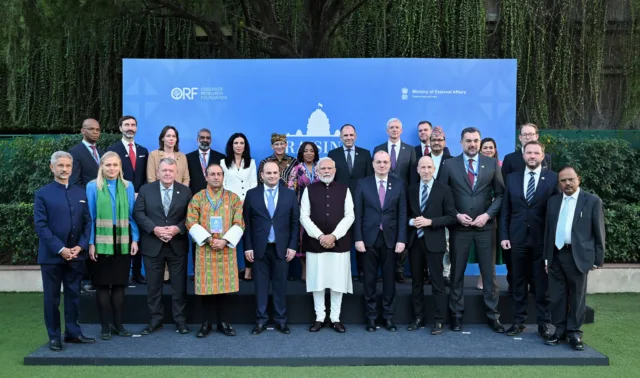The ninth edition of the Raisina Dialogue, a prestigious annual conference focusing on geopolitics and geoeconomics, unfolded in New Delhi from February 21st to February 23rd, 2024. The conference, inaugurated by Prime Minister Narendra Modi, drew attention from global leaders and experts as they convened to address pressing issues confronting the world. Joining the inaugural session as the chief guest was Greece’s Prime Minister Kyriakos Mitsotakis, adding to the event’s significance and international representation. Hosted by the Observer Research Foundation, in partnership with the Ministry of External Affairs of India, the Raisina Dialogue serves as a platform for multi-stakeholder discussions involving heads of state, cabinet ministers, officials, thought leaders, and representatives from various sectors including politics, business, media, and academia.
The theme for the 2024 edition, “Chaturanga: Conflict, Contest, Cooperate, Create,” outlined the core focus areas around which discussions revolved. Over the three-day conference, participants engaged in dialogue across six thematic pillars, addressing critical topics such as technological advancements, environmental sustainability, global security challenges, multilateralism, the post-2030 agenda, and the evolution of democracy. With over 2,500 participants from approximately 115 countries, both in-person and through digital platforms, the Raisina Dialogue provided a diverse and inclusive forum for global leaders to exchange ideas, insights, and solutions. Among the attendees were ministers, former prime ministers, military commanders, technology leaders, academics, journalists, and experts from leading think tanks.
The conference highlighted the urgency of addressing the rapidly evolving geopolitical and geoeconomic landscape, characterized by challenges such as rising global security concerns, climate change, technological disruptions, and the need for reforming multilateral institutions. India’s engagement at the Raisina Dialogue underscored its commitment to promoting global cooperation, addressing common challenges, and advancing the interests of the Global South. Through discussions on topics ranging from technological regulation to climate finance and regional security issues, India aimed to foster inclusive partnerships and collective action. Furthermore, the Dialogue served as a platform for India to assert its vision for a pluralist world order, marked by strengthened multilateralism, global peace, and sustainable development. By emphasizing the importance of collaboration and creative solutions, the Raisina Dialogue contributed to shaping global discourse and charting a course towards a more secure, prosperous, and equitable future.
Throughout the three-day Raisina Dialogue, a diverse array of participants from across the globe engaged in substantive discussions and deliberations on a wide range of pressing issues. Among the attendees were heads of state, cabinet ministers, former prime ministers and presidents, military commanders, technology leaders, academics, journalists, and experts from leading think tanks. The dialogue covered a multitude of topics under the six thematic pillars, with each session delving deep into the complexities and nuances of the respective subjects. Here’s a brief overview of the key discussions and conclusions reached during the conference:
- Tech Frontiers: Regulations & Realities: Participants examined the transformative impact of technological advancements such as artificial intelligence (AI) and quantum computing on various sectors. Discussions centered on the need for robust regulations to ensure responsible and ethical use of technology, while also harnessing its potential for innovation and economic growth.
- Peace with the Planet: Invest & Innovate: This session focused on environmental sustainability and climate action. Participants highlighted the importance of investing in renewable energy sources, adopting sustainable practices, and enhancing international cooperation to combat climate change and achieve the goals outlined in the Paris Agreement.
- War & Peace: Armouries & Asymmetries: Discussions in this session revolved around global security challenges, including regional conflicts, terrorism, and asymmetric warfare. Participants emphasized the importance of dialogue, diplomacy, and conflict resolution mechanisms to address underlying tensions and promote peace and stability.
- Decolonising Multilateralism: Institutions & Inclusion: The session explored the need for reforming multilateral institutions to make them more inclusive, representative, and responsive to the evolving needs of the international community. Participants discussed ways to address power imbalances and ensure equitable participation in global decision-making processes.
- The Post 2030 Agenda: People & Progress: This session focused on advancing the Sustainable Development Goals (SDGs) and addressing socio-economic inequalities. Participants emphasized the importance of inclusive growth, social welfare programs, and empowering marginalized communities to achieve sustainable development and improve quality of life globally.
- Defending Democracy: Society & Sovereignty: Discussions in this session centered on the evolving challenges to democratic governance, including authoritarianism, election interference, and the erosion of democratic norms and institutions. Participants underscored the need to uphold democratic principles, protect human rights, and strengthen democratic institutions to safeguard global peace and stability.
Throughout the dialogue, participants exchanged perspectives, shared best practices, and identified common areas of interest and collaboration. While the conference concluded with a sense of urgency and shared responsibility to address the complex challenges facing the world, it also underscored the importance of collective action, cooperation, and inclusive partnerships in shaping a more secure, sustainable, and prosperous future for all.









